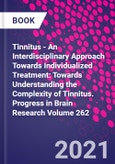Tinnitus - An Interdisciplinary Approach Towards Individualized Treatment: Towards Understanding the Complexity of Tinnitus, Volume 262, the latest release in the Progress in Brain Research series, highlights new advances in the field, with this new volume presenting interesting chapters on current topics such as Cochlear implantation for patients with tinnitus - a systematic review, Event Related Potentials to Assess the Tinnitus complaint during drug treatment, The difference in post-stimulus suppression between residual inhibition and forward masking, Sleep, sleep apnea and tinnitus, A Bayesian brain in imbalance: medial, lateral and descending pathways in tinnitus and pain, Tinnitus features according to caffeine consumption, and much more.
Please Note: This is an On Demand product, delivery may take up to 11 working days after payment has been received.
Table of Contents
1. Cochlear implantation for patients with tinnitusa systematic review
Kelly Assouly
2. Event Related Potentials to Assess the Tinnitus complaint during drug treatment
Andr?ia Aparecida Azevedo Sr.
3. The difference in post-stimulus suppression between residual inhibition and forward masking
Pierre Hadrien Bourez
4. Sleep, sleep apnea and tinnitus
Lien-Chen Liu
5. A Bayesian brain in imbalance: medial, lateral and descending pathways in tinnitus and pain
Dirk De Ridder
6. Separate auditory pathways for the induction and maintenance of tinnitus and hyperacusis?
Jos J. Eggermont
7. Tinnitus features according to caffeine consumption
Ricardo Rodrigues Figueiredo
8. Modulation of sound and tinnitus loudness in tinnitus patients with and without hearing loss following three weeks of acoustic stimulation
Sylvie H?bert
9. Evidence for biological markers of tinnitus: A systematic review
Ha?la Haider
10. Metabolic changes in the brain and blood of rats following acoustic trauma, tinnitus and hyperacusis
Yiwen Zheng and Dirk De Ridder
11. Low inter-rater consistency in semantic profiles of tinnitus-like sounds rated by tinnitus patients
Petteri Hyv?rinen
12. Comparing pure tone and narrow band noise to measure tonal tinnitus pitch-match frequency
Daniela Korth and Orlando Guntinas-Lichius
13. The Stochastic Resonance model of auditory perception: a unified explanation of tinnitus development, Zwicker tone illusion, and residual inhibition.
Patrick Krauss
14. Altered brain responses to emotional facial expressions in tinnitus patients
Katharina Rosengarth
15. The effects of noise exposure and aging on spontaneous neuronal activity in the auditory midbrain
Roland Schaette
16. A comprehensive literature search to identify existing measures assessing "concentration" as a core outcome domain for sound-based interventions for chronic subjective tinnitus in adults.
Maryam Shabbir
17. Tinnitus and its associations with general health, mental health and hearing loss in a population study
Inge Stegeman
18. Impact of tDCS and HD-tDCS on tinnitus perception: a scoping review
Giriraj Shekhawat
19. Auditory synaptopathy in mice lacking the glutamate transporter GLAST and its impact on brain activity
Christopher R. Cederroth
20. Using gap-induced inhibition of the post-auricular muscle response as an objective measure of tinnitus in humans
Mark Nelson Wallace
21. Vagus nerve stimulation for tinnitus: a review and perspective
Berthold Langguth, Dirk De Ridder and Sven Vanneste
22. What kind of sorcery is this? Unintended prolonged tinnitus suppression after short-term acoustic stimulation: Case reports
Patrick K.A. Neff
23. On the relationship between tinnitus distress, cognitive performance and aging
Patrick K.A. Neff
24. What is tinnitus? Issues and justifications for a definition
Arnaud Nore?a and Philippe Fournier
25. The More the Merrier? Influence of Treatment Duration and Stimulation Frequency on Multisite Repetitive Transcranial Magnetic Stimulation in Chronic Tinnitus
Peter M. Kreuzer
26. Structural correlates of the audiological and emotional components of chronic tinnitus
Dirk De Ridder
27. Bottom-up deafferentation or deficient top-down noise-cancelling underpin the log-dynamics in phantom sounds
Sven Vanneste








